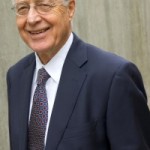
Co-Founder and CEO, Zenger Folkman
John H. “Jack” Zenger is the co-founder and chief executive officer of Zenger Folkman, a professional services firm providing consulting, leadership development programs and implementation software for organizational effectiveness initiatives. Jack is considered a world expert in the field of leadership development, and is a highly respected and sought after speaker, consultant and executive coach. His career has combined entrepreneurial, corporate and academic activities. In 1977, he co-founded Zenger-Miller and served as its president and CEO until 1991. The Wall St. Journal named it one of the 10 best suppliers of executive development. He later became the president of Provant, a publicly traded combination of 21 companies in the training industry. From 1966 to 1977, Jack was vice president of human resources for Syntex Corporation, and from 1992 to 1996, was a group vice president of the Times Mirror Corporation. Jack’s academic experience includes serving on the faculty at the University of Southern California (USC) and later teaching at the Stanford Graduate School of Business. In 2011, Jack was honored with the American Society of Training and Development’s Lifetime Achievement in Workplace Learning and Performance Award, given to one recipient per year. Because of his contributions to the field of leadership development and training, Jack was inducted into the Human Resources Development Hall of Fame. His colleagues in the training industry awarded him the “Thought Leadership Award” in 2007. He and his wife Holly both received honorary doctoral degrees from Utah Valley University. He received a doctorate in business administration from the University of Southern California, an MBA from UCLA and a bachelor’s degree in psychology from Brigham Young University. Jack served as the chairman of the board of trustees of Utah Valley University and currently is a regent for the higher education system in the State of Utah. Jack has authored or co-authored 50 articles on leadership, productivity, e-learning, training and measurement. He is the co-author of five books on leadership, Results-Based Leadership, (Harvard Business School Press, 1999) voted by the Society for Human Resource Management (SHRM) as the Best Business Book in the year 2000, the best selling The Extraordinary Leader: Turning Good Managers into Great Leaders (McGraw-Hill, 2002), Handbook for Leaders (McGraw-Hill 2004), The Inspiring Leader: Unlocking the Secrets of How Extraordinary Leaders Motivate (McGraw-Hill 2009) and The Extraordinary Coach: How the Best Leaders Help Others Grow (McGraw-Hill 2010). He is the author of two books on productivity improvement: Not just for CEO’s – Sure-Fire Success Secrets for the Leader in Each of Us (Irwin Professional Publishing, 1996) and Making 2 + 2 = 5: 22 Action Steps to Boost Productivity (Irwin, 1997). He is a co-author of three books on teams, including the best selling, Self-Directed Work Teams: The New American Challenge (Irwin Professional Publishing, 1990), Leading Teams (Irwin Professional Publishing, 1993) and Keeping Teams on Track (Irwin Professional Publishing, 1996).
http://zengerfolkman.com/jack/
On the show, Jack spoke about Zenger Folkman recently completed a large project to identify those individuals who are truly great at innovation and what distinguishes those people. In addition to having a long-term, customer-focused vision and a lot of trust from their colleagues, these people tend to have real reciprocal trust, in the sense that highly innovative individuals are often wonderful to work with, and members of innovative companies can trust that being moved around isn’t a sign to leave the company, it’s normal and the employees trust in being moved and restructured. In addition, he spoke about complement skill sets – just as runners also bike, swim, lift weights and so on, it’s good to recognize that some traits complement one another. The connection doesn’t need to be clear, just the statistical connection. Jack connected this to his pharmaceutical experience, wherein he saw drugs connected to outcomes without mechanisms being entirely clear, and this makes him comfortable identifying complementary skill sets that can cross-trained to make innovators even more effective.








